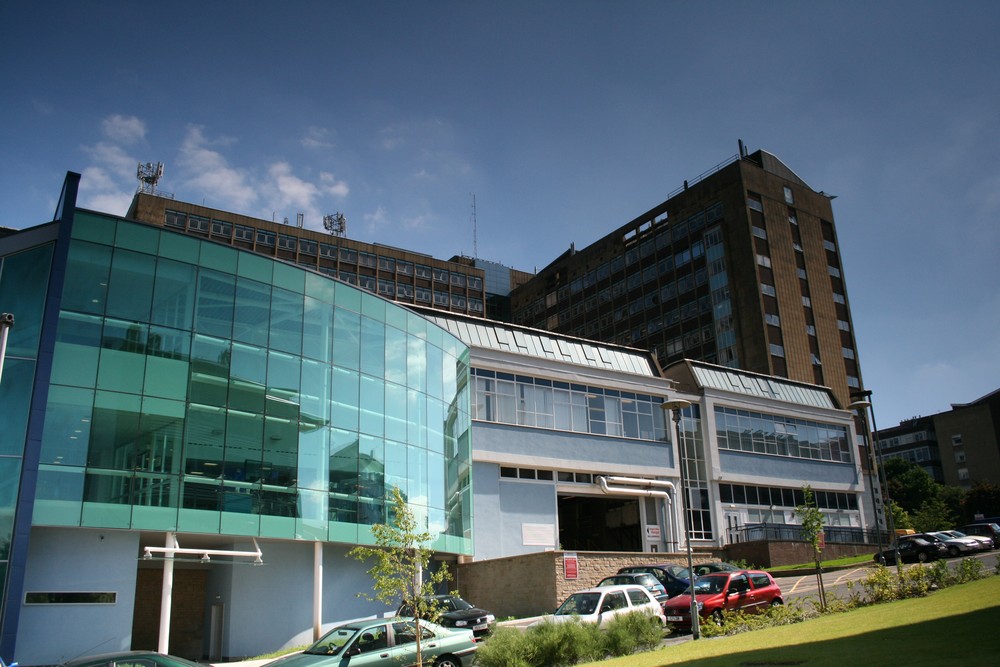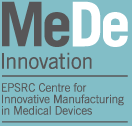Our Centres
Our centres of founding academic partners bring significant capabilities and are recognised nationally and internationally.
In combination their quality of staff, research output, facilities and infrastructure are creating a world leading Centre to address the needs of medical devices manufacturers through robust research projects aimed at addressing specific manufacturing challenges.

The Institute of Medical and Biological Engineering (iMBE) at the University of Leeds has the largest independent simulation facility in the world for total artificial joints. The facility houses more than 500m2 of class 2 clean rooms and over 80 stations of full joint simulations. Since the early 1990’s research at iMBE has focused on developing advanced methods of simulation which extend beyond current international standards, reflecting a wider range of clinical conditions, developing personalised functional computational models, and models to predict functional biocompatibility. These methods have been applied to understand the reasons for clinical failure of materials and support the development and manufacture of improved device designs and biomaterials through collaborative projects. We have significant expertise in cross-linked polyethylene for knee, rotating platform and uni-compartmental knees, ceramic matrix composites for hip and the ceramic on metal hip.
Supported by our intellectual property portfolio on immunocompatible biomimetic natural scaffolds, we are also researching and developing functional soft tissue solutions.
Biomimetic natural scaffolds which retain the essential biological and biomechanical attributes of natural tissue offer great potential for the re-engineering and regeneration of orthopaedic tissues in which restoration of physical function is critical immediately upon implantation. Our biomimetic natural acellular scaffolds can be implanted directly and regenerated by the recipients own endogenous stem cells, or can be regenerated with differentiated or stem cells in vitro in bespoke physically interactive bioreactors.
Alongside iMBE’s research expertise, we have considerable experience of professional leadership and innovation development in the public and private sectors.
At Newcastle University, the MeDe Innovation researchers focus on developing new biomaterials with new capabilities for supporting the musculoskeletal system, and on developing new methods of processing biomaterials to create the next generation of medical devices. Research addresses the design and manufacture techniques, processes and systems required to underpin the development and delivery of innovative materials and products.
The work is interdisciplinary, with input from across the Faculty of Science, Agriculture and Engineering and the Faculty of Medical Sciences to ensure that both the mechanical and biological functionality of novel materials and devices can be understood and assessed. The use of additive manufacture and biofabrication techniques to create devices is a significant focus of the work, with a wide range of additive manufacture processes for processing biopolymers and bioceramics, and a dedicated cell printing and biofabrication laboratory for cell/material co-processing. A further research theme is the development of hybrid natural-synthetic biomaterials in order to combine excellent bioactivity from natural materials with the load bearing capacity of synthetic materials.
The Advanced Materials Research Group (AMRG) is one of the largest research groups with 20 academics and 70 researchers in the faculty of engineering at the University of Nottingham and is housed in the Wolfson Building. The AMRG carry out research at the forefront of materials processing, materials science and materials engineering. Their research is underpinned by state-of-the-art processing and characterisation facilities.
The Group’s strategic research themes are: Bio-materials – cell surface interactions, biopolymers and composites, biomanufacturing, biocompatibility and scaffolds for regenerative medicine. Functionality and Structure of Materials – structure of complex disordered materials, novel variants of electron microscopy, soft condensed matter, mechanics of polymeric materials, in service microstructure, cellular material. Glassy materials – Advanced Optical Glasses, Mid Infrared photonics, Degradable glasses, Glasses for healthcare. Energy Materials – Solid state hydrogen storage, thermal storage, solid oxide fuel cells, organic semiconductors, conventional energy, Modelling energy storage and system. Nano-materials – Nano -structuring, nano-synthesis and manufacture, membranes, multi-layered structures, thin films from electrical, and energy applications to medical devices. Porous materials – Cellular materials, porogens and porosity from impact applications to spinal discs. Surface engineering of materials – Tribology, Corrosion, thermal spraying, coatings, surface modification, laser processing; from aerospace to medical applications.
Six of these seven research themes have project and applications directly relevant to Medical Devices. The strength of the group is the ability to work from fundamental research to scale up manufacturing within the larger Faculty of engineering housing many pilot scale processing equipment such as thermal spray booths, atomisation chambers, hydrothermal synthesis rigs, polymer processing, clean rooms, glass process melt and processing and other physical and chemical processes all of which lie in the AMRG’s portfolio.

Advanced Materials Engineering research at Bradford is at the forefront of many of the new material development technologies such as electronic polymers, biomaterials, advanced ceramics, nanocomposites and ‘smart’ materials which are making an enormous impact in the lives of millions of people.
The Polymer Interdisciplinary Research Centre brings a unique capability in leading edge precision polymer processing, including micro moulding, small scale extrusion and solid phase orientation processing of polymers and biomaterials. The Bradford team offers novel manufacturing research in structuring polymers and biomaterials via high precision processing operations over the length scales, but particularly in small or micro scale processing, for which it leads an international network.
Professor Coates has been in the University for 26 years, and has been much involved in the successful restructuring of Engineering, Design & Technology as well as leading one of the largest research operations in the University, plus a wide range of external responsibilities as a journal editor and with professional institutions in the UK and abroad.
At the University of Sheffield, the Bioengineering & Health Technologies group undertakes pioneering research into advanced biomaterials and medical devices, making scientific and technical advances to restore the form and function of the head, neck and mouth. This is essential because the face defines human identity, and disease or trauma therefore undermine quality of life. Technological advances substantially improve clinical outcomes, and we bring with industry, clinicians, scientists and engineers together to make a difference to people worldwide.
Professor Hatton has interests in biomaterials, medical devices and tissue engineering for clinical applications in human skeletal tissues. The five major themes for his research are (1) the development of bioactive glasses and ceramics for mineralised tissue repair, (2) novel injectable materials for bone regeneration, (3) In vitro evaluation of biocompatibility, and (4) musculoskeletal tissue engineering using biomaterial scaffolds. He is also active more broadly in the promotion of academic-industrial collaboration and technology transfer in the orthopaedic, craniofacial and dental material sectors.
